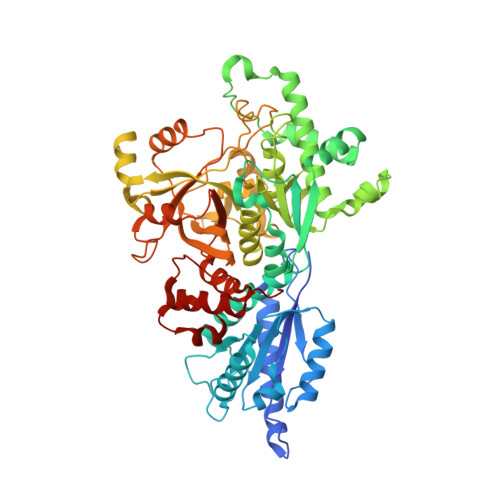Structural and Functional Analysis of Fucose-Processing Enzymes from Streptococcus Pneumoniae.
Higgins, M.A., Suits, M.D., Marsters, C., Boraston, A.B.(2014) J Mol Biol 426: 1469
- PubMed: 24333485
- DOI: https://doi.org/10.1016/j.jmb.2013.12.006
- Primary Citation of Related Structures:
4C20, 4C21, 4C22, 4C23, 4C24, 4C25 - PubMed Abstract:
Fucose metabolism pathways are present in many bacterial species and typically contain the central fucose-processing enzymes fucose isomerase (FcsI), fuculose kinase (FcsK), and fuculose-1-phosphate aldolase (FcsA). Fucose initially undergoes isomerization by FcsI producing fuculose, which is then phosphorylated by FcsK. FcsA cleaves the fuculose-1-phosphate product into lactaldehyde and dihydroxyacetone phosphate, which can be incorporated into central metabolism allowing the bacterium to use fucose as an energy source. Streptococcus pneumoniae has fucose-processing operons containing homologs of FcsI, FcsK, and FcsA; however, this bacterium appears unable to utilize fucose as an energy source. To investigate this contradiction, we performed biochemical and structural studies of the S. pneumoniae fucose-processing enzymes SpFcsI, SpFcsK, and SpFcsA. These enzymes are demonstrated to act in a sequential manner to ultimately produce dihydroxyacetone phosphate and have structural features entirely consistent with their observed biochemical activities. Analogous to the regulation of the Escherichia coli fucose utilization operon, fuculose-1-phosphate appears to act as an inducing molecule for activation of the S. pneumoniae fucose operon. Despite our evidence that S. pneumoniae appears to have the appropriate regulatory and biochemical machinery for fucose metabolism, we confirmed the inability of the S. pneumoniae TIGR4 strain to grow on fucose or on the H-disaccharide, which is the probable substrate of the transporter for the pathway. On the basis of these observations, we postulate that the S. pneumoniae fucose-processing pathway has a non-metabolic role in the interaction of this bacterium with its human host.
Organizational Affiliation:
Department of Biochemistry and Microbiology, University of Victoria, PO Box 3055 STN CSC, Victoria, BC, V8W 3P6, Canada.


















